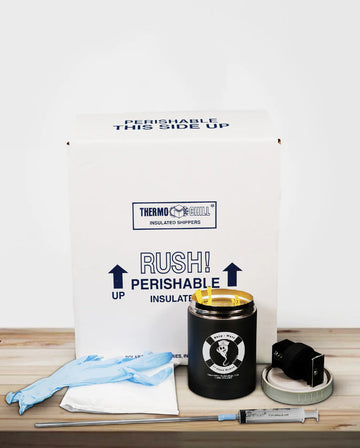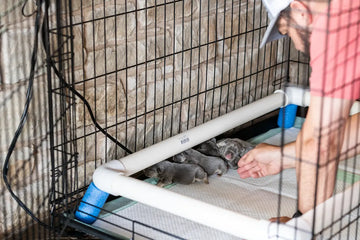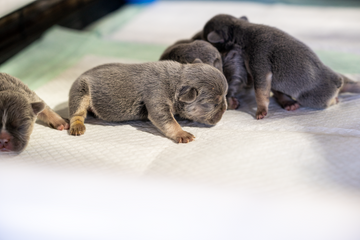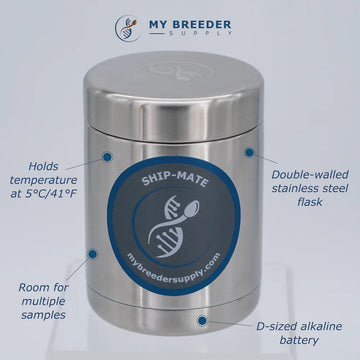How Cold is Too Cold for Newborn Puppies? Temperature Guidelines and Safety
by Phenyx Media on Sep 18, 2023
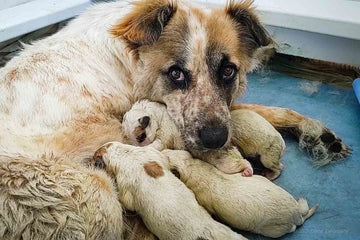
Greetings, fellow dog lovers! Isn't it a joy to see those tiny, cute puppies toddling around, with their innocent eyes full of curiosity and excitement? However, with great joy comes great responsibility. When it comes to these newborn bundles of joy, understanding their vulnerabilities is crucial to ensure they grow up healthy and strong. One such vulnerability is their sensitivity to cold temperatures.
Ever wondered, 'how cold is too cold for newborn puppies?' Well, let's unravel this question together.
Understanding Puppy Thermoregulation
We all know that maintaining an optimal body temperature is crucial for survival. But what about our furry friends? Can they adjust to temperature changes like we do?
Why Puppies Are Sensitive to Cold?
Puppies, particularly newborns, lack the ability to regulate their body temperature effectively. Unlike adult dogs, their thermoregulation system (the magical mechanism that maintains body temperature) isn't fully matured yet. Now, this can make your puppies more susceptible to external temperature changes than older dogs. You know the chills you get during a freezing winter day? Well, your little puppies can't even shiver to warm themselves up!
How Cold is Too Cold for Newborn Puppies?
While there's no universally accepted number to this question, several factors influence it. From their breed and size to their overall health and age, every element plays a crucial role. However, as a general guideline, the ambient temperature for newborn puppies should hover around 85-90°F (29-32°C) during the first week. After that, you can reduce the temperature by a few degrees each subsequent week.
Recognizing Hypothermia in Puppies
Understanding hypothermia signs in puppies is just as vital as keeping them warm. Hypothermia can sneak up on our tiny pals if we aren't watchful enough.
Signs of Hypothermia
The signs of hypothermia in puppies may include unusual lethargy, a weak pulse, and shallow breathing. These puppies might even lose their appetites - a red flag, considering how much these little furballs usually love their meals! Think about it: it's like how you'd feel after an extra-long, frigid winter day - only worse since these pups can't express their discomfort.
Precautions to Protect Puppies from the Cold

Being proactive in securing our puppies' warmth and safety in cold temperatures is not just recommended; it's imperative.
Keeping the Environment Warm
The first step is to create a warm environment for your puppies. It could be a snug corner in your living room, a temperature-controlled kennel, or a designated puppy room. In essence, you're giving them a slice of tropical paradise right at home!
Using Puppy Heating Pads
Puppy heating pads can be a godsend in this endeavor, providing direct warmth to your puppies. However, just like with any heating element, be sure to monitor their use closely to avoid overheating.
Dressing Your Puppies for Cold
Who said sweaters and puppy clothes are only for fashion? Dressing your puppies for cold can not only help them stay warm but also look adorably stylish!
Maintaining Proper Nutrition
Maintaining proper nutrition plays a crucial role in ensuring your puppies can generate adequate body heat. A well-balanced diet can act as their natural heater, warming them from within.
How to Warm a Hypothermic Puppy
Hypothermia in puppies is a critical situation that requires immediate attention. Warm blankets, a cozy spot near the heater, or a hot water bottle wrapped in a towel can help restore a hypothermic puppy's body temperature. Remember, the keyword here is 'gentle warmth.' Avoid direct contact with overly hot surfaces.
Veterinary Assistance for Cold Puppies
When it comes to ensuring your puppies' health, there's no better ally than a trusted veterinarian. Always reach out to a professional if your puppy shows signs of hypothermia or if you're unsure about their temperature needs.
Common Questions About Puppy Cold Tolerance

What's the ideal temperature for a 3-week-old puppy?
By the time your puppies are 3 weeks old, they can tolerate a slightly cooler environment. Typically, the recommended ambient temperature should be around 75-80°F (24-27°C). However, it's always a good idea to observe your puppies. If they're huddled together and whining, they might be cold. Conversely, if they're trying to get away from each other and panting, they might be too warm.
How can I keep my newborn puppies warm at night?
Several methods can help keep your puppies warm at night. These include using a puppy heating pad, a heat lamp, or a hot water bottle (ensure it's adequately wrapped to prevent overheating or burns). Also, keep them in a draft-free room and consider using a blanket or a towel for added insulation. Be sure to keep the mother close by, as her body heat can help keep the puppies warm.
How long can puppies stay in the cold?
The duration a puppy can tolerate cold weather largely depends on its breed, age, health status, and the temperature itself. Newborn puppies are particularly sensitive and should not be exposed to cold weather at all. Older puppies, especially those of cold-tolerant breeds, might be able to handle brief periods outside in the cold, but it's always best to consult your vet before doing so.
Can puppies sleep outside in the cold?
Newborn puppies should never sleep outside in the cold. They lack the necessary fat and fur to keep themselves warm and are prone to hypothermia. Older puppies, particularly those of cold-tolerant breeds, may be able to tolerate cooler temperatures, but it's generally recommended to keep all puppies indoors, especially during cold weather.
How to warm up a cold puppy quickly?
If you find your puppy cold, wrap it in a warm towel or blanket immediately. Provide a source of gentle heat, like a hot water bottle wrapped in a towel, but avoid direct contact with hot surfaces. Make sure the heating is gradual; a sudden change can be harmful. Offer warm fluids to drink. If your puppy doesn't show signs of recovery soon, contact your vet immediately.
It's always important to keep a watchful eye on your puppies and consult with your vet if you're unsure about anything. After all, they rely on you for their comfort and well-being.
Ensuring the right temperature for your newborn puppies is crucial for their survival and healthy growth. Recognizing the signs of hypothermia and understanding the necessary precautions can help you raise happy, healthy puppies.

